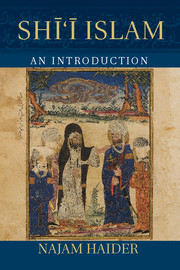Book contents
- Frontmatter
- Dedication
- Contents
- List of Tables and Maps
- Acknowledgments
- Note on the Cover Image
- A Note on Transliteration and Dating
- Maps
- Introduction
- Section 1 Theology
- Section 2 Origins
- Section 3 Constructing Shī‘ism
- Section 4 Shī‘ism in the Modern World
- Appendix Verses Mentioned in the Argument from Qur’ānic Expectations in Chapter 3
- Index
Section 2 - Origins
Published online by Cambridge University Press: 05 August 2014
- Frontmatter
- Dedication
- Contents
- List of Tables and Maps
- Acknowledgments
- Note on the Cover Image
- A Note on Transliteration and Dating
- Maps
- Introduction
- Section 1 Theology
- Section 2 Origins
- Section 3 Constructing Shī‘ism
- Section 4 Shī‘ism in the Modern World
- Appendix Verses Mentioned in the Argument from Qur’ānic Expectations in Chapter 3
- Index
Summary
Origins
Memories matter. They reflect a community's understanding of its origins, legitimizing the present through a connection with the past. Important narratives acquire a cosmic significance, often authorizing the emergence of new communal identities. The tellings and retellings of these narratives embody the changing situation of a community. The same story used to advocate patience in one period might become a call to arms in another. This section focuses on two types of historical narratives, the first central to the construction of a broad Shī‘ī identity and the second pivotal in its fragmentation.
As noted in Section 1, later Shī‘ī scholars provided a theological justification for the Im¯amate through arguments rooted in the Mu‘tazilī doctrine of rational divine justice. These arguments emphasized both the political (in the case of Zaydīs) and the knowledge (in the case of Ismā‘īlīs and Twelvers) dimensions of the Im¯amate. In the early history of the Shī‘a, by contrast, there is scant evidence of Mu‘tazilī influence, and discussions of the Imāmate are largely embedded in historical narratives. Because little historical material survives from the seventh through ninth centuries, most extant Shī‘ accounts are informed by later theological developments. Historical events thus provide a canvas for the articulation of Shī‘ī identity. Stories of the past function as proof texts meant to uphold the veracity of Shī‘ī doctrinal beliefs.
- Type
- Chapter
- Information
- Shi'i IslamAn Introduction, pp. 51 - 52Publisher: Cambridge University PressPrint publication year: 2014

